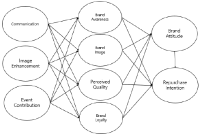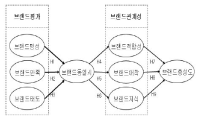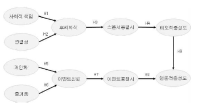
Purpose This study was to examine the relationships among title sponsor's social inference(majority exposure, reliability, topicality, & social response), sponsor attitude formation(sponsor attitude, event sponsorship attitude, & communication attitude), and sponsorship effect (sponsor identification, attitudinal loyalty, and behavioral loyalty) in the professional volleyball contexts. Methods A survey was conducted by using college students (n=370) majoring in sport and physical education at four universities located in Chungcheong Province. The data were recorded and analyzed using the SPSSWIN Ver. 21.0 and AMOS 18.0 to analyze the structural equation model. Results First, the increased majority exposure had a significantly negative effect on sponsor attitude. Second, reliability was found to impact significantly on sponsor attitude. Third, topicality was found to impact positively and significantly on sponsor attitude. Fourth, social response did not show significant impact on sponsor attitude. Firth, sponsor attitude was found to significantly influence on event sponsorship attitude. Sixth, sponsor attitude had positive impact on communication attitude. Seventh, event sponsorship attitude was found to impact positively and significantly on sponsor identification. Eighth, communication attitude was found to impact positively and significantly on sponsor identification. Ninth, sponsor identification was found to impact positively and significantly on attitudinal loyalty. Tenth, sponsor identification was found to impact positively and significantly on behavioral loyalty. Finally, attitudinal loyalty was found to impact significantly and positively on behavioral loyalty.


Purpose The purpose of this study was to provide title sponsorship marketing strategies by defining the relationship between professional volleyball title sponsorship, brand equity, brand attitude, and repurchase intention. Methods This study distributed 390 questionnaires to 2018-2019 V-League audiences and a total of 313 questionnaires were used as final validity sample. For data analysis, SPSS 21.0 and Amos 18.0 were used for frequency analysis, reliability analysis, confirmatory factor analysis, and structural equation analysis. Results First, title sponsorship had significant influence on brand equity, therefore hypothesis 1~3 were accepted, except for 1-3(perceived quality) and 1-4(brand loyalty). Second, among brand equity subfactors, hypothesis 4-1(brand awareness) and 4-4(brand loyalty) had significant influence on brand attitude which made hypothesis 4 partially accepted . Third, among brand equity subfactors, only brand image(hypothesis 5-2) had significant influence on repurchase intention which made hypothesis 5 partially accepted. Lastly, brand attitude had significant influence on repurchase intension, which made hypothesis 6 accepted. Conclusions It is anticipated that based on the result of the study, effective marketing strategy can be developed for title sponsorship companies in the future.


This study is aimed at identifying the relationship among brand evaluation, brand identification, brand relationship, and brand loyalty towards professional baseball title sponsors in an empirical manner. The target of this study is 'Korea Yakult,' a baseball title sponsor in 2014. A survey was conducted on 377 home crowd members of Nexen, Doosan, LG and SK based in metropolitan regions. Sampling method was Convenience Sampling Mode, and questionnaire has been structured to be self-administerd type. SPSSWIN Ver. 21.0 and AMOS 18.0 have been used for data processing. The findings are as follows. First, the brand reputation had a significant impact on brand identification. Second, the brand satisfaction had no significant impact on brand identification. Third, the brand attitude had a significant impact on brand identification. Fourth, the brand identification had a significant impact on brand suitability. Fifth, the brand identification had a significant impact on brand attachment. Sixth, the brand identification had a significant impact on brand knowledge. Seventh, the brand suitability had a significant impact on brand loyalty. Eighth, the brand attachment had a significant impact on brand loyalty. Ninth, the brand knowledge had a significant impact on brand loyalty.


Purpose The purpose of this study was to examine the relationships among sponsorship attributes, sponsorship benefits, recognition of sponsorship value, sponsorship attitude, and sponsorship certainty through structural equation model. Methods Respondents were university students living in Seoul, Kyoungki-do, and choongchung-do. The present study was designed to identify the effect of title sport sponsorship by utilizing NH V-LEAGUE title sponsorship. By using convenience sampling method, total 400 questionnaires were distributed and gathered from samples, and among them 369 valid samples were used for further analyses. The data were recorded and analyzed using the IBM SPSSWIN Ver. 21.0 and AMOS 18.0. 18.0. Results First, sponsorship attributes had a positive influence on sponsorship benefits. Second, sponsorship benefits had a positive influence on sponsorship value recognition. Third, sponsorship attributes had no positive influence on sponsorship attitude. Fourth, sponsorship benefits had a positive influence on sponsorship attitude. Fifth, sponsorship value recognition had a positive influence on sponsorship attitude. Sixth, sponsorship attitude had a positive influence on sponsorship attitude certainty. Seventh, sponsorship certainty had a positive influence on sponsorship effects (image improvement, favorability, purchase intention).


The purpose of this study was to develop a model of relationship intensification, identification formation, and loyalty achieved through mutual effect within participants of sports sponsorship. Through this, the study aims to provide guidance to businesses for establishing and developing sports sponsorships. In order to achieve the objective, two identification paths were used to understand the process of deepening consumer-sponsor relationship in professional volleyball title sponsorships. The target of this study is 'NH Nonghyup' a valleyball title sponsor in 2014-2015. A survey was conducted on 264 home crowd members of Korea Air, Samsung fire, Kepco, Woori card, OK saving bank and Hyundai capital based in metropolitan regions. Sampling method was Convenience Sampling Mode, and questionnaire has been structured to be self-administerd type. SPSSWIN Ver. 21.0 and AMOS 18.0 have been used for data processing. The results were as follows: Frist, the study showed that the connection between consumer-sponsor mutual effect positively influence "we-ness." "We-ness" in turn positively affected sponsor identification, and sponsor identification in turn positively affected attitudinal loyalty. Second, the personalization and enjoyment in consumer-event mutual effect positively affected event trust, and event trust in turn positively affected event identification, and event identification in turn positively affected behavioral loyalty. Third, attitudinal loyalty positively impacted behavioral loyalty.
